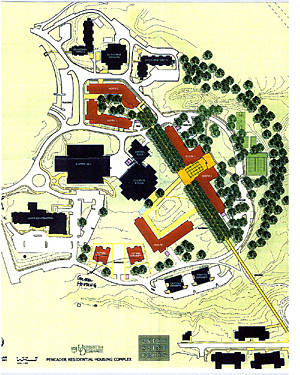

UDaily is produced by the Office of Public Relations
150 South College Ave.
Newark, DE 19716-2701
(302) 831-2791
|
 |
Faculty Senate reviews e-mail monitoring policy, construction plans
4 p.m., Oct. 17, 2003--Following a change in the Delaware Code, the state now requires that UD employees be notified and acknowledge that their electronic transmissions may be monitored. Despite the requirement for notification and acknowledgement, Provost Dan Rich told the Faculty Senate on Monday, Oct. 13, that the University will not routinely monitor communications of its members by e-mail, voice or individual Internet usage without compelling reasons.
Among the compelling reasons he listed were rampant computer viruses or other threats to the integrity of the UD information network, use of electronic communications to harass faculty, staff or students or access to content required by a lawful subpoena, criminal or civil, or search warrants.
There is nothing new about these possibilities, Rich said, and there has been no change in UD policy about the monitoring of electronic communications. What has changed, he said, is that Delaware law now requires all employers to notify their employees of their monitoring policies and receive acknowledgement of that notification.
Only employees who receive benefits from the University are affected, Rich said, adding that students, graduate students and research assistants are not included in the notification process required by the change in the state code. Nevertheless, he said, all students are required to know and abide by the University’s Responsible Computing Manual.
“We elected the easiest method to meet the state requirement,” Rich said. One-time electronic notification and acknowledgement by faculty and staff will bring UD into compliance with Delaware Code, he said. Of the 4,075 employees who received the notification, some 3,255 have acknowledged that they received the notice and reviewed the policy.
To further consider matters of privacy in electronic communications, the Faculty Senate and the Provost’s Office will cosponsor a University Forum on this subject in the spring. A leading scholar and expert in the field will address the issue and then open the forum for general discussion, Rich said.
Rich also announced the membership of the University Council on Student Diversity and Success [http://www.udel.edu/PR/UDaily/2004/csds101303.html] and the formation of a program planning committee on the interdisciplinary study of ethics and policy [http://www.udel.edu/PR/UDaily/2004/ethics092903.html]. He said that 100 faculty were already offering courses related to ethical policies related to science and technology.
The University currently has 1,140 faculty members, including 57 new colleagues, Rich said. He added that UD relies on supplemental faculty in less than 10 percent of its classes and the University is committed to continue hiring full-time faculty.
Graduate and undergraduate enrollment totals are the same as last year, Rich told the senators, with 21,000 full- and part-time students. Applications reached a record high this year with 22,000 undergraduates and more than 7,000 graduates seeking admission.
The overall admission rate for undergraduates was 42 percent—38 percent for non-resident applicants—and 28 percent for graduate students, “putting us among the most selective group of colleges,” Rich said.
“Despite this overall selectivity, 73 percent of Delawareans who completed undergraduate applications were admitted to the Newark campus and another 21 percent to the Parallel Program,” he said.
 David Hollowell, executive vice president and University treasurer, presented an update on completed construction projects, including the renovated Pencader Dining Hall, the interior of the computing center on Wyoming Road, additional laboratory space in Otis Smith Laboratory in Lewes and renovated bathrooms in Morris Library and part of the Christiana Towers. Improved lighting in the Library and several other buildings on campus will save up to $500,000 a year, Hollowell predicted. David Hollowell, executive vice president and University treasurer, presented an update on completed construction projects, including the renovated Pencader Dining Hall, the interior of the computing center on Wyoming Road, additional laboratory space in Otis Smith Laboratory in Lewes and renovated bathrooms in Morris Library and part of the Christiana Towers. Improved lighting in the Library and several other buildings on campus will save up to $500,000 a year, Hollowell predicted.
According to Hollowell, future projects include plans to connect two former fraternity houses near Old College to provide the future home of the Department of Foreign Languages and Literatures and the replacement of the Pencader residence hall complex over the next three years.
Hollowell told the senators that the first of two five-story brick buildings will be located in the current Pencader recreation area. Designed to resemble the more traditional buildings on the main campus, the new residence halls will reflect a modern interpretation of the Georgian style, he said.
Architectural renditions of the new Center for the Arts, expected to be completed by 2006, also were presented by Hollowell at the meeting. The center, which will be built on the current parking lot next to the Amy E. du Pont Music Building, will include a 200-seat recital hall, a 450-seat proscenium theatre and an orchestra rehearsal room with 300 retractable seats. The second level will include practice rooms.
In the spring, construction of a parking deck with 750 spaces will begin.
Article by Cornelia Weil
 E-mail this article
E-mail this article
To learn how to subscribe to UDaily, click here.
|
 |

|

